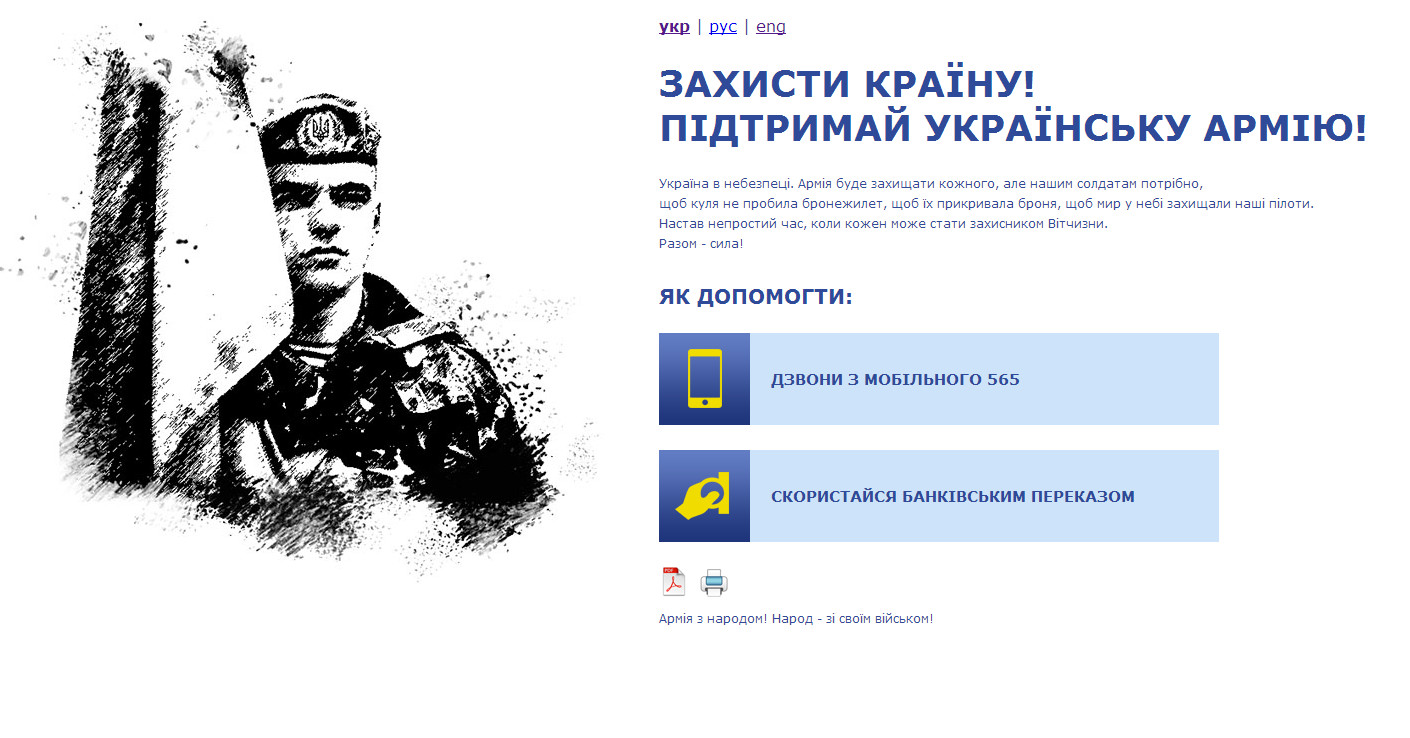Crowdsourcing Defence and Trust
What can you get for half a dollar these days? In most Western countries, it isn’t much. You can’t even buy a cup of coffee. But if you happen to own a mobile number through one of Ukraine’s mobile operators, you have an interesting opportunity to help buy some military equipment for the Ukrainian army.
April 29, 2014 -
Igor Lyubashenko
-
Articles and Commentary

Screenshot from Ukraine's Ministry of Defence
On March 13th 2014, Ukraine’s ministry of defence declared the start of a new campaign called “Support the Ukrainian Army”. Initiated at a moment when the Ukrainian society was motivated by a largely unexpected intense preparation for the “legitimisation” of Crimea’s annexation by the Russian Federation, this campaign became one of the most successful crowdsourcing campaigns in the recent history of Ukraine. There are two ways to support Ukrainian defence capabilities – via a bank transfer or via the abovementioned mobile phone call that costs approximately half a buck. According to the Ukrainian edition of Forbes, during first two weeks of the campaign, an equivalent of around 10 million US dollars was collected. This money is reported to be spent on sleeping bags, camouflage nets and body armour for Ukrainian troops.
This initiative is a perfect example of the significant change in Ukrainian society that was caused by the experience of the Euromaidan – the people’s growing readiness to take responsibility for developments in the country. In February 2014, before the dramatic finale of the Kyiv protests, a poll conducted by the Kyiv-based Democratic Initiative Foundation among Ukrainian experts shows that the Euromaidan created new possibilities for the development of civil society in Ukraine. There was no consensus, however, whether these chances could be utilised. The most important influences of the Euromaidan are: the increase of civic activism, the development of a habit of self-organisation, the development of social capital; the increase of understanding of society’s power; and an increase in readiness to provide financial support for grassroots initiatives.
To a large extent, the whole Euromaidan movement, and in particular the functioning of its permanent form – a camp in the centre of Ukraine’s capital – was possible thanks to crowdfunding. Although the movement was reported to have obtained financial resources from some of the so-called oligarchs (there is no exact and confirmed information relating to the names and sums), the most important innovation of the Euromaidan – from a Ukrainian perspective – is the huge solidarity among ordinary citizens, also the one expressed in such material form.
The campaign by the ministry of defence is definitely not a grassroots initiative, but in a given political situation it became a perfect move to utilise the emotions of a crowd in a productive way. In one of my previous articles, I’ve signalled a concern that the Euromaidan’s aspiration for more transparency may paradoxically become harmful for the development of Ukraine’s democracy, which is – according to Ivan Krastev – impossible without trust.
Ten million dollars will not decide the future of Ukraine. The genuine value of the initiative is the trust in Ukraine’s interim government that is expressed through a much harder form than often elusive opinion polls. More than any questionnaire, it confirms Ukrainians’ readiness to make efforts for the future of their country.
Igor Lyubashenko is a contributing editor to New Eastern Europe. He is an academic teacher, new media enthusiast and international relations analyst. He has a PhD in Political Science from the Maria Curie-Sklodowska University in Lublin.

































